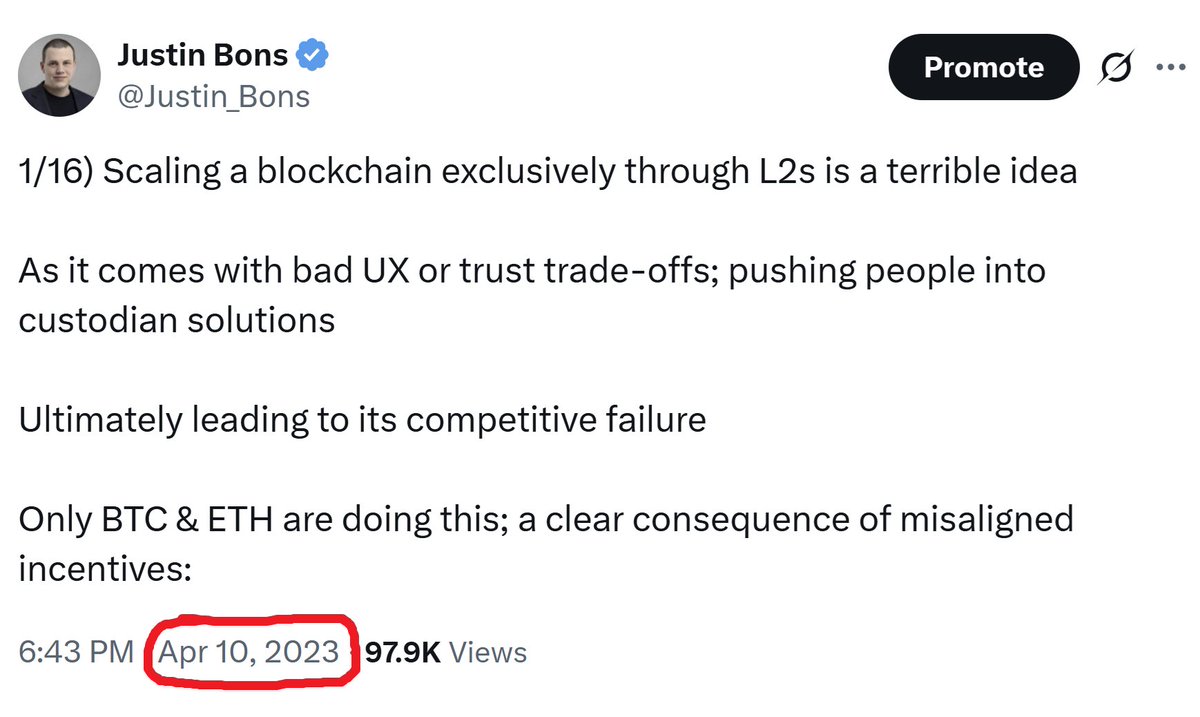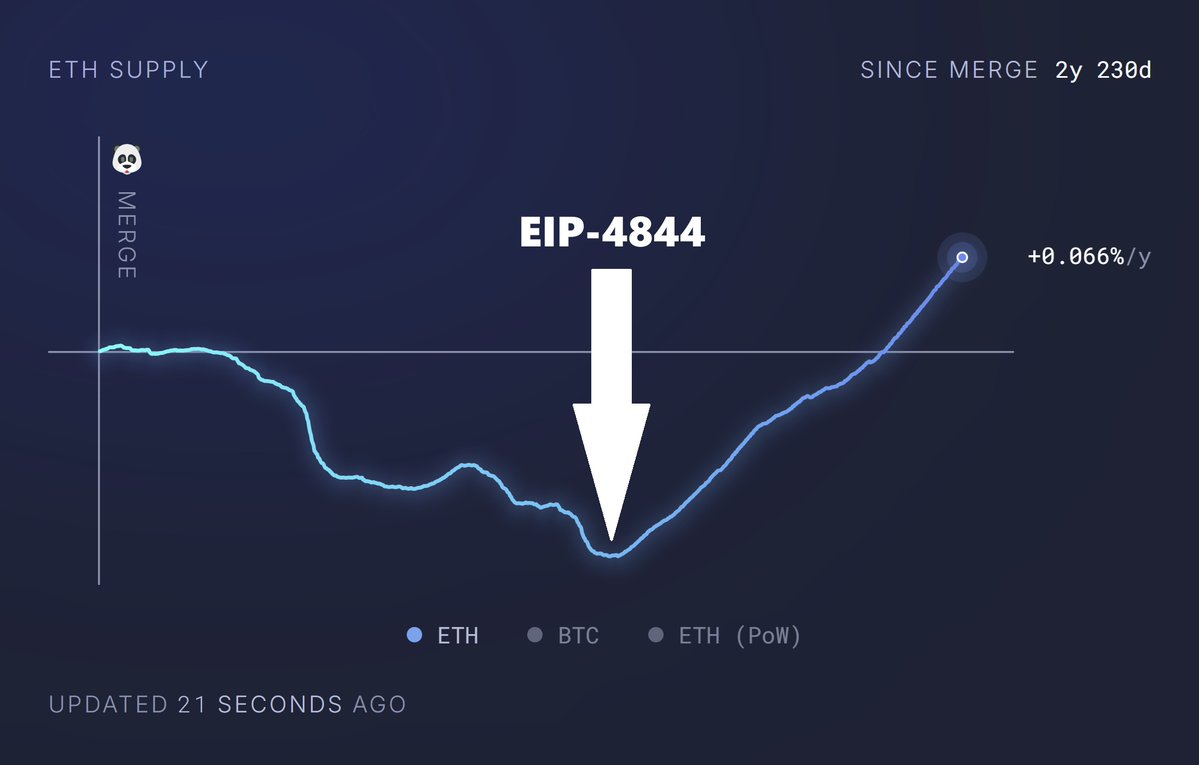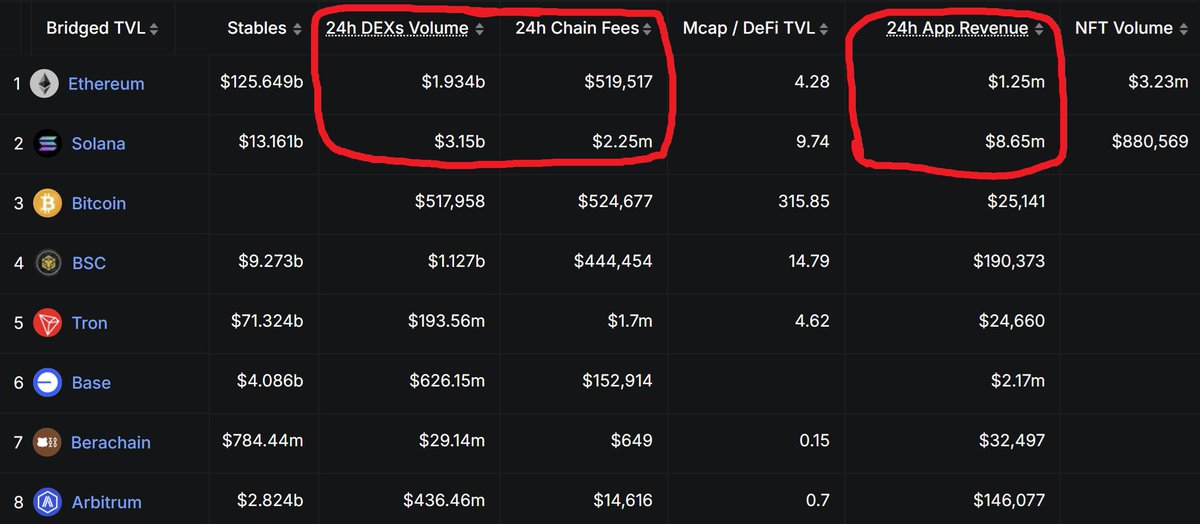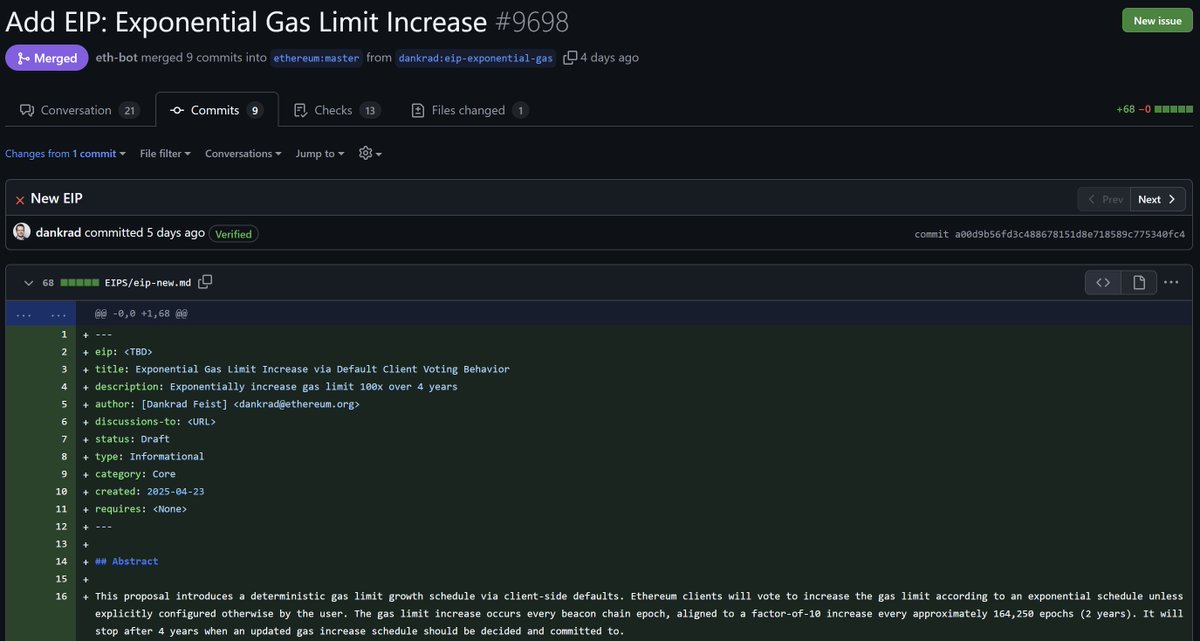ETH's pivot back to L1 scaling is too little, too late
Increasing ETH's speed will take 5+ years (BEAM) all to make ETH 8x slower than SOL is now...
Optimistically, ETH gets 5x capacity by 2026, which is still 40x less than what SOL has now!
ETH is losing so hard it hurts! 🧵
The reason is clear: ETH's "L2 scaling" roadmap is to blame. It is not marketing, UX, vibes, the ETF or even PMF. Any blockchain (L1) that does not scale cannot compete; that is the bottom line!
The "L2 scaling" roadmap has been parasitic, as it allowed these for-profit, centralised & permissioned L2's to take the majority of users while only passing a fraction of those fees back down to ETH's L1.
This is what absolutely wrecked ETH's economics, as we can see in the chart below. Because inflation reversed dramatically at the very same time blobs (L2 scaling) were first properly implemented:
This is how ETH managed to lose its lead to SOL & I am not at all convinced it can regain its position now.
As the damage has already been done, even ETH's blue-chip DeFi protocols like UNI & AAVE are already committed to migrating away from ETH, as they are moving to their own app-chains.
Realistically speaking, SOL offered a faster, cheaper & more secure product that is also far more decentralised compared to ETH L2's. Explaining how SOL was able to overtake ETH so dramatically:
All while SOL's capacity remains several orders of magnitude higher, even when we account for ETH's updated, more optimistic roadmap. While completely ignoring that SOL's development is not static either!
ETH's pivot away from L1 scaling was a total betrayal of the cypherpunk ethos & the equivalent of an L1 committing seppuku. In the least honourable way possible, as people sold out for the sake of L2 tokens & equity, a traitorous act.
Born from a seriously perverse set of incentives that allowed underpaid devs to become millionaires by not scaling the L1 & launching rent-seeking L2's instead...
The thread linked to below goes into far more detail about exactly why "L2 scaling" does not work & why it will never work:
Major props to @dankrad for his latest proposal to increase the gas limit x100 over 4 years! That would allow ETH to compete with SOL, even if the timeline is still too long from my perspective:
He is precisely the hero that ETH needs, even if he is not the hero ETH deserves. Unfortunately, the pushback on GitHub indicates pressure for far more conservative numbers. Explaining one of the many reasons why I remain sceptical that such an aggressive proposal would ever actually pass. Nonetheless, even discussing this type of change is still a very big deal:
My History with ETH:
This is all coming from one of ETH's biggest supporters, as I mined ETH within the first week of launch in 2015, with my 15-kilowatt mining farm at the time. Even defending ETH against all of the criticisms as an active bitcoiner. All while the fund I manage: @CyberCapital (the oldest liquid token fund in the world!), had ETH as its largest investment, since its launch in 2016!
That is up to early 2023, when ETH's pivot away from L1 scaling became final & clear. This is when I turned critic, predicting ETH's downfall at the peak of its prominence, specifically due to its "L2 scaling" roadmap:
What was particularly surprising was how fast I was ostracised for going against the party line, as I went from a respected community member to persona non grata pretty much overnight. That hurt, from the attacks & blocks, as I formerly respected many of these people.
So this latest narrative shift is vindicating for me, even if I doubt that the recognition from the ETH community will ever come, as it is far more convenient to ignore voices like mine, even if that is to their detriment.
Now that the L1 scaling narrative has returned on ETH, which I applaud. Despite all of the ridicule I received for that very same position. Even if I still think it is too little, too late now. I did have to reconsider it very seriously over the last few weeks.
Even though I would love to be proven wrong, the current prognosis is not good at all when we objectively compare & contrast.
Such an increase several years ago would have convinced me to stay with ETH, but today it amounts to no more than a "token" increase.
Simply increasing gas limits only takes ETH so far, as it is a brute force approach. More elegant designs are required to push the envelope. Something ETH in truth is utterly incapable of without serious long-term engineering efforts, which have been deprioritised due to the "L2 scaling" roadmap. That is where it caused the most harm, as the gap now is so incredibly large.
Governance
Ultimately, if we dig down deeper, ETH's governance is the cause for all of these failures. Because that is how these terrible decisions were made, I am convinced things would have worked out very differently with a better decision-making process.
This is why I am an advocate of stakeholder governance today. Having the owners actively vote over major decisions makes perfect sense in terms of the effectiveness of decision making & fairness. This is also a model that has been proven to work in traditional company ownership as well.
Especially compared to the alternative, which is centralised control & gatekeeping of the codebase by a relatively small cabal of elitist devs, often in ivory towers. Who are also extremely vulnerable to capture by external parties, such as "L2 scaling" interests.
This is also why adding a decentralised treasury from fees & inflation further secures the neutrality of the chain by providing an L1-biased source of funding. Something that has been demonstrated by OG chains such as DASH, DCR & XTZ over long periods of time.
Unfortunately, the people in power at the top of this relatively centralised pyramid structure. Have actively opposed the idea of stakeholder governance. This should not come as a surprise, as people historically rarely surrender their own power & influence voluntarily. A historical rule with very few exceptions.
In truth, the ETH developers by 2021 & 2022 should have been "fired" & replaced with ones that could deliver on the original promise of sharding. A form of L1 scaling that would have allowed for massive capacity increases without increasing node requirements, true horizontal scaling without compromise. Now, chains such as NEAR, EGLD & SUPRA have fully delivered on this promise. This exposes the ETH developers who said this was "too hard" for ETH to implement!
Stakeholder governance would have also solved this problem by defunding mediocracy while promoting excellence. That is called accountability, due process, divisions of power & actual decentralised decision making, in other words, good governance!
Conclusion
This has been the first glimmer of hope for positive reform in years, exceeding my expectations of what is possible within ETH politics.
I want ETH to succeed, as the damage done by BTC & ETH failing in my eyes has done immeasurable harm to our industry, likely setting us back decades.
So, ETH turning that failure around to a success would make me overjoyed! That is why I remain vigilant & watch for changes carefully, as I have for BTC for all these years as well. While also applying as much pressure as I can through such critiques.
However, the actual governance structure of ETH is highly centralised, along with the fact that these people are, for the most part, all invested in these L2's.
Unless, ofcourse, they have finished dumping on retail & they are desperate to remain relevant while literally watching their main chain die over the last few years...
This is not a popularity contest or tribalistic game to me; I do not care who delivers on the promise of crypto. Or even the moral character of the actors involved. Scalability on the L1 is an absolute must; that is what really matters, & ETH has spent the last few years vilifying this idea & its proponents.
While actively promoting centralised L2's that can all censor & steal user funds. This will be something that will be very difficult for a lot of the egos involved to admit, creating further resistance to change. Another unfortunate consequence of highly centralised governance.
I went from being a bitcoiner to a bitcoin critic & ETH supporter. I then went from being a SOL critic to a supporter in light of ETH's failure to scale. There is a high probability that I will change my mind again in the future. I do not care if that will be ETH, SUI or even ADA!
It is the cypherpunk revolution that matters & right now ETH still stands in the way of that dream. ✊




46.67K
0
The content on this page is provided by third parties. Unless otherwise stated, OKX is not the author of the cited article(s) and does not claim any copyright in the materials. The content is provided for informational purposes only and does not represent the views of OKX. It is not intended to be an endorsement of any kind and should not be considered investment advice or a solicitation to buy or sell digital assets. To the extent generative AI is utilized to provide summaries or other information, such AI generated content may be inaccurate or inconsistent. Please read the linked article for more details and information. OKX is not responsible for content hosted on third party sites. Digital asset holdings, including stablecoins and NFTs, involve a high degree of risk and can fluctuate greatly. You should carefully consider whether trading or holding digital assets is suitable for you in light of your financial condition.

